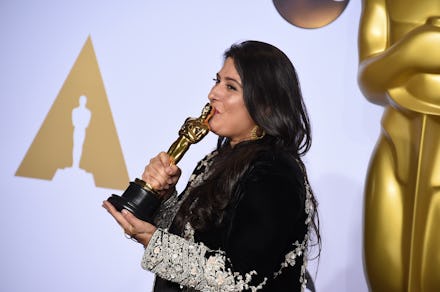Women and People of Color Did OK at the Oscars — Just Not in the Top Categories

If you watched the 2016 Academy Awards with no knowledge of which categories were important, you might think it was a pretty diverse set of winners.
Both documentary Oscar winners (Amy's Asif Kapadia and A Girl in the River: The Price of Forgiveness' Sharmeen Obaid-Chinoy) are filmmakers of South Asian descent. Chilean director Gabriel Osorio Vargas and producer Patricio "Pato" Escala Pierart won the best animated short category for their film Bear Story. The female talent behind the very feminist Mad Max: Fury Road won for best editing, production design, makeup and more. The film's costume designer, Jenny Beavan, even had her own breakout fashion moment at the Oscars.
Read more: The Oscars Are Nearly as Male as They Are White
But the Oscars are not an even playing field. Shorts do not receive the same attention and focus as features; documentary filmmakers don't make headlines the way actors do. Indeed, as you read the list of who and what won gold, the closer you get to best picture in status, the less diverse it becomes.
Among the 43 individuals who won Oscars Sunday night, 36 were white. That means only roughly 16% of Oscar winners this year are nonwhite. There were slightly more female winners than people of color — 12 to seven — but that still means only about 28% of winners were female. This is only slightly better than the last decade's average; from 2006 to 2015, 19% of all Oscar nominees were female.
There was only one woman of color to win an Oscar Sunday night: Obaid-Chinoy.
In the top eight categories (picture, director, plus the acting and screenwriting races), 13 Oscars were given to nine men and four women. Naturally, all four acting Oscars went to white people, because there were literally only white people to choose from.
There was one big win for a person of color: Alejandro Gonzalez Iñárritu won the best director statuette for the second year in a row. Of course, as New York magazine's Lindsay Zoldaz pointed out on Twitter, Iñárritu's award comes with quite the bit of trivia attached: He now has more best director Oscars than literally all women.
Interestingly, the last award of the night brought a rare example of gender parity. Of the four producers of Spotlight who won best picture — Michael Sugar, Steve Golin, Nicole Rocklin and Blye Pagon Faust — two are women who worked on the film for eight years.
As many have previously noted, representation behind the camera does lead to more inclusive films. Seeing women and nonwhite producers and creatives onstage may not be exciting, but it is important for actually effecting change.
Ideally, the changes to membership Academy of Motion Picture Arts and Sciences president Cheryl Boone Isaacs announced in January will produce not just more inclusive nominee pools, but actual winners as well. The wins for women and people of color in below-the-line categories are good, but that representation should be present across the board.
Until awards season heats up again, discussion of the Oscars' diversity problems will cool. Isaacs and her team should be active and vigilant in the off-season, however. Otherwise, #OscarsSoWhite will become the trilogy no one wants to see.
Correction: July 19, 2016
Get the five stories that will challenge you to rethink the world by signing up for MicCheck Daily.